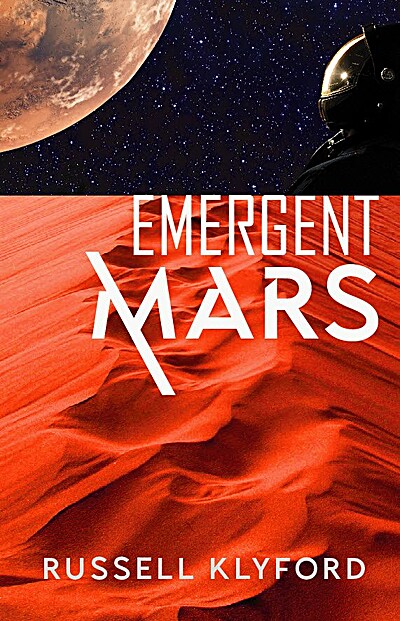Book Review: Emergent Mars
Review: Emergent Mars by Russel Klyford
"In which a classic Sci-Fi novel critiquing modern society is attempted but can't be bothered to tell much of a story while doing it."
 Synopsis: Intrepid but emotionally damaged war correspondent Ailia Bax is sent to Mars to report on the emerging situation there. She's expected to maintain an Earth-centric bias in her reporting but ultimately does not, instead giving up her ties to Earth and falling in with the residents of Mars. Somewhere along the line, she finds the culprit in a series of terrorist bombings.
Synopsis: Intrepid but emotionally damaged war correspondent Ailia Bax is sent to Mars to report on the emerging situation there. She's expected to maintain an Earth-centric bias in her reporting but ultimately does not, instead giving up her ties to Earth and falling in with the residents of Mars. Somewhere along the line, she finds the culprit in a series of terrorist bombings.
Review: Read that synopsis again. That is, quite literally, all that actually happens in Emergent Mars. It is inevitable that it will happen and that it will happen exactly as it does in this "novel". I put novel in quotes on purpose.
Generally speaking, a novel requires about 70 - 100 thousand words to be truly considered a novel. Along the way there should be plot, characters, growth and hopefully, interesting things happening.
Unfortunately, Emergent Mars fails, at a minimum, the word count test. To be sure, there are well more than 70,000 words inside the covers of this book, but very, very few of them are actual story. And, when it comes to the other requirements for a novel, they are mostly there only to create some space between what amounts to lengthy political rants about the state of things today and how much better things would be if only we would adopt the author's recommendations for how things should be. Emergent Mars is a long series of political essays carried out as dialog between two people, one of whom is always completely versed in whatever theory they are currently espousing while the other sits in the chair opposite and nods agreement without ever putting any real thought into any potential points of contention. They're just there to act as audience surrogates, and not particularly astute ones at that.
I'm not even going to discuss the actual politics on display here. It just doesn't matter when considering whether the novel is good or not. Depending on your point of view of the world as it currently stands, you'll either agree or not agree as you see fit. Which is part of the problem. There's nothing here to convince you one way or the other to carefully consider your own assumptions about how the world works. Unlike classics of the genre such as Animal Farm, Brave New World, or 1984 , there's no real story here to help you see why these things need to be rethought. We're told a lot of things are going on to make all this mass of politics necessary but never really shown anything that is at all helpful in translating what we are being told is the way things should be into something useful. It's like sitting through an endless series of university lectures on a subject you have no real interest in, just for the course credits. After a few minutes, it all becomes a series of droning noises you can easily ignore in favor of whatever it is you are doodling in your notebook.
After the first 100 pages, the book becomes a slog as you try to work your way to the end of it. Were it not for the need to review it, I'd have put this down at that point and never even felt bad about it. The only interesting element left to me at that point was reading to see if my initial guess as to the culprit behind the bombings was what I thought it was going to turn out to be. It was. So, a completely unnecessary reading.
The fact that this is a Science Fiction novel is curious as well. There's no real reason for it to be so. The planet Mars is a sort of painted backdrop against which a variety of characters come on stage, deliver their political speeches, and move off again, turning up at the end for the end-of-play cast party. For all the use the characters make of it, the setting could as easily be a remote tropical island, an isolated wilderness settlement, or even an underwater research facility. None of which would have made any difference at all to what Klyford did with this novel. Mars is of no more consequence than the font used to type the story.
If you're into lengthy political diatribes, with a vaguely Martian-red color theme, then by all means, try to get over it before you're reduced to picking up Emergent Mars.